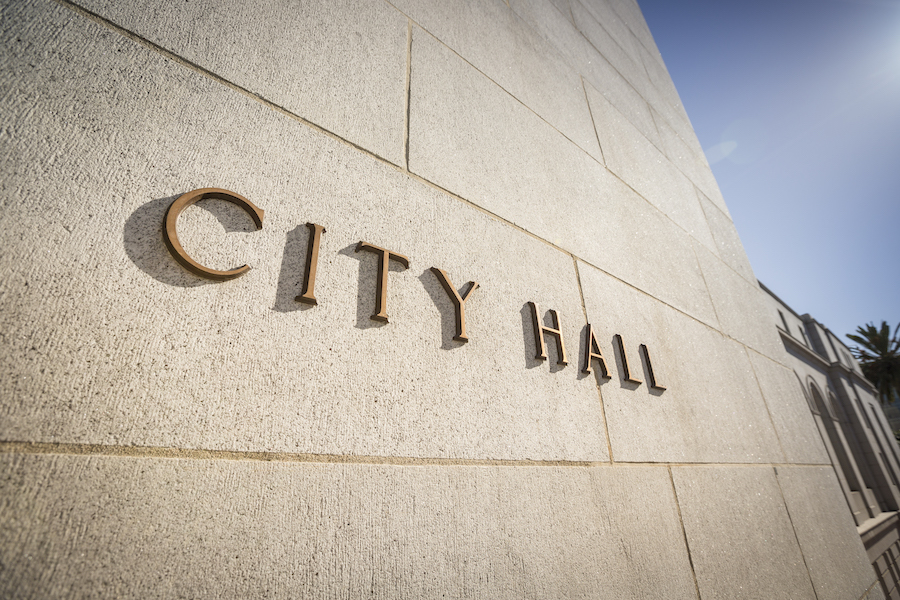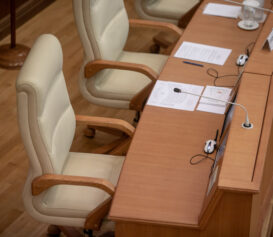Another council meeting brought another round of proposed bills that could impact NYC owners and managers.
This month, we’re starting by separating legislation from what’s been passed, and what’s still in committee. Each rule has a broad overview, any critical details, and a link so you can read the full proposed text. You can also track any specific rules using the city’s legislation website.
Approved By Council
Electric Vehicle Supply Equipment In Garages
Owners of parking garages and open parking lots with 10 or more spaces (that are licensed by DCWP) must install Electric Vehicle Supply Equipment (EVSE) in 20% of parking spots and ensure that 40% of parking spots are capable of supporting EVSE by January 1, 2035.
Adjustments or waivers may be granted based on things like structural infeasibility. Garages and lots not licensed by DWCP must conduct a study and issue a report no later than 2 years from the effective date of this rule (April 2026) recommending the required level of EVSE installation. The DOB would then promulgate rules to implement the above requirements for lots not licensed by DWCP, as well as report annually on installations.
This law was approved by the council on March 7th and sent to the Mayor’s desk for signature. If it goes unsigned 30 days later, it automatically becomes law. Given that DOB requirements are explicitly laid out in the law, there’s more to come here – stay tuned for updates from the Department.
In Committee
FISP Outreach & Notice Requirements
The DOB would be required to “create and maintain” a program helping owners find labor (QEWIs) and financial resources (loan information) to comply with facade inspection requirements.
Owners who received notice of unsafe conditions (through filings or otherwise) would have to notify building occupants of the unsafe condition. Notices would have to be affixed in the lobby and remain until the conditions were corrected. Additionally, notice would have to be given to occupants in “at least one additional manner as established by the commissioner by rule.”
Clarifications on the Pet Law
This law would add new language regarding waiving the covenant or lease provision prohibiting household pets if a summary proceeding/action isn’t taken within three months of knowledge of the pet being harbored. Additionally, “Such waiver shall remain effective for the duration of the occupant’s occupancy and shall permit the occupant to replace pets with pets of the same species.”
Required Protective Devices for Seniors & Persons With Disabilities
This law would require owners to install certain protective devices for seniors and persons with disabilities in multiple dwellings. Devices would be installed upon the tenant’s request, and would include items like grab bars in the bathroom and floor treads. There would be no cost to the tenant, but eligible owners would be entitled to a tax abatement. A notice requirement is also part of the law, and would have to be provided on an annual basis.
Two Proposals – Snow & Ice Removal
The first proposal related to ice and snow applies to “seniors and certain persons with disabilities,” who would receive reduced fines for failing to perform required snow removal. The proposal would also require the DSNY to establish a program to help seniors and persons with disabilities with snow removal from sidewalks abutting buildings such individuals own, lease, or occupy. The date required to create the program has passed, so it’s likely a program would be introduced before the next winter season if this bill passes.
On the other end of things, penalties would be increased for chain businesses that fail to remove snow, ice, and dirt from their sidewalks. Chains here are defined as follows:
The term “chain business” means any establishment that is part of a group of establishments that share a common owner or principal who owns at least thirty percent of each establishment where such establishments (i) engage in the same business or (ii) operate pursuant to franchise agreements with the same franchisor as defined in general business law section 681.
Chains would be liable for penalties ranging from $500 – $5,000, depending on the amount and frequency of infractions.
Commercial Lease Negotiation
This proposal would require landlords to negotiate in good faith towards a rent concession “where the tenant’s business is required to close pursuant to an order issued as a result of a state of emergency.”
This would apply to “covered properties”, or any property or portion of a property (i) that is lawfully used for buying, selling or otherwise providing goods or services or for other lawful business, commercial, professional services or manufacturing activities, and (ii) for which a certificate of occupancy authorizing residential use of such property or portion of a property has not been issued.
Photos Required For DOB Violations
In last month’s roundup, we outlined proposals for the DSNY to take pictures of Sanitation infractions. Here’s a similar proposal, this time centered on DOB infractions.
The DOB would have to:
- Attach pictures to NOVs where the commissioner notes the violation is viewable and capable of being captured by photograph
- Note that the official record for subsequent inspections for opportunities to cure must include photographs confirming that such violation was cured
- Publish a list of violations on its website subject to these requirements
Separately, a new bill referred to committee on March 19th touches on required photos for HPD violations. That brings the total proposed photo bills to 4 across 3 agencies – so far.
Affordable Housing on PW1
This proposal would require the DOB to ask questions about affordable housing on the PW1 application for proposed work/alterations. Applicants would have to include:
- The number of affordable units in the building
- The number of additional affordable units that will be constructed, if any
- The income eligibility for each affordable unit in the building and each affordable unit that will be constructed, if any
Tenant Harassment – Definition Expansion, Unlawful Eviction, & Relief
This proposal would expand the definition of tenant harassment to include unlawful evictions. It would also expand the Certificate of No Harassment pilot program to include buildings where owners were found to have committed unlawful evictions.
This proposal would raise civil penalties for unlawful eviction and prohibit owners who engage in unlawful eviction from taking part of any city subsidy, tax abatement, or tax exemption program for 5 years from the date of unlawful eviction. Additionally, owners who engage in unlawful evictions would be able to set aside a portion of the building for affordable housing in order to cure the record of such unlawful eviction violations.
This proposal clarifies that in harassment claims lawful occupants may not be denied an application for injunctive relief, including restoration of possession, because they are not tenants. They may also not be denied on the basis that the court deems such restoration futile “because the lawful occupant would be subject to a meritorious claim of possession against them, as long as no such judgment of possession has actually yet been granted.”
As an aside, the council is also calling on the governor to sign legislation requiring unlawful eviction cases to be heard within 5 days. You can read more about that here.
HPD Complaint Timing
When a complaint is filed with HPD that would constitute an “immediately hazardous violation,” [editor’s note: Class C infractions] HPD would contact the complainant within 5 hours of receipt to determine whether the condition described in the complaint requires further inspection or investigation. HPD “shall conduct an inspection of the dwelling no later than one day after receiving such complaint, provided that an inspection is warranted after responding to such complaint [editor’s note: the 5-hour response call], and shall notify the complainant.”
Hazardous violations (or Class B infractions) would have something similar, with the timing being 2 days to contact and 1 day to perform inspections. If this goes into effect, there will more than likely be additional departmental rules clarifying any changes to the existing process or new available information – stay tuned here.
Fine Shift For Permit Expirations
This new proposal would shift fine liability for work done after permit expirations from building owners to contractors performing the unpermitted work. Based on the proposed text, fines for not having a permit at any point would still go to the building owner.
Code Amendments For Abatement of Taxation on Alterations and Impovements
Finally, a substantial proposed rule was submitted by request of the Mayor. The 14-page long draft, shared here, includes abatement information for certain multiple dwellings. More to come if and when this rule progresses.
What’s Next?
Rules in committee are reviewed, debated, and adjusted as necessary. The process can also include public testimony. From there, rules can either be held over or passed by the committee. If passed, the rule would be brought for a vote in front of the full council. If approved by the council, the mayor can sign it, veto it, or not take any action – effectively making it law within 30 days.
The Committee on Housing and Buildings met on March 19th in advance of the council meeting later that afternoon. The agenda didn’t address many of the above proposals, focusing on rent stabilization instead. The next full council meeting is scheduled for April 11th, with no housing committee meetings slated yet.
As always, we’ll keep you posted on changes to any of the above – and how your team can take action on new rules to protect your buildings, and most importantly, the people inside them.




